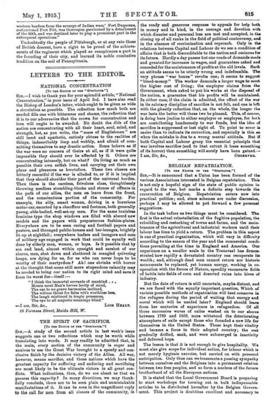LETTERS TO THE EDITOR.
NATIONAL CONCENTRATION
[To Wle EDITOS or on ..SPZerLSOL'.]
SIR,—I wish to thank you for your splendid article, "National Concentration," in your issue of April 3rd. I have also read the Bishop of London's letter, which ought to be given as wide a circulation as possible. The reflection how much both are needed fills one with bitterness and shame, the reflection that it is to our adversaries that the crown for concentration and iron will ought to be awarded. No doubt the elite of the nation are concentrating with all their heart, soul, mind, and strength, but, as you write, the "mace of Englishmen" are still inert and apathetic, entirely obtuse to the realities of things, indescribably limp and wobbly, and afraid of com- mitting themselves to any drastic action. Some behave as if the war were no concern of their. at all, as if it were quite impossible they should ever be affected by it Others are concentrating intensely, but on what P On living as much as possible their own selfish lives, and carrying out their own plans and pleasures as heretofore. These two classes are bitterly resentful if the war is alluded to, or if it is implied that they should shoulder their part of the universal burden. Then there is the careless, frivolous class, thoughtlessly throwing needless stumbling-blocks and stones of offence in the path of our allies, the men on leave from the front, and the conscientious portion of the community. For example, the silly, smart woman, driving in a luxurious motor-car, escorted by a chauffeur and footman, both generally young, able-bodied, well-set-up men. For the same brainless feminine type the shop windows are filled with absurd new models and the papers with preposterous fashion-plates. Everywhere are to be seen racing and football papers and posters, and thronged public-houses and bar-lounges, brightly lit up at nightfall; everywhere loafers and loungers and men of military age engaged in work that could be equally well done by elderly men, women, or boys. Is it possible that by sea and land, almost within eyesight and earshot of our shores, men, shot down and shattered in mangled quivering heaps, are dying for us, for us wbo can never hope to be worthy of their martyrdom ? Alit one shrinks with horror at the thought that some still more stupendous calamity may be needed to bring our nation to its right mind and save it from its worst foe—itself " I think the immortal servants of mankind . s Mourn most Man's barren levity of mind, The car to no grave harmonies inclined, The witless thirst for false wit's worthless lees, The laugh mistimed in tragic presences, The eye to all majestic meanings blind."
am, Sir, &c., Lore HEALY.
29 Formosa Street, Mae Hill, W.


































 Previous page
Previous page